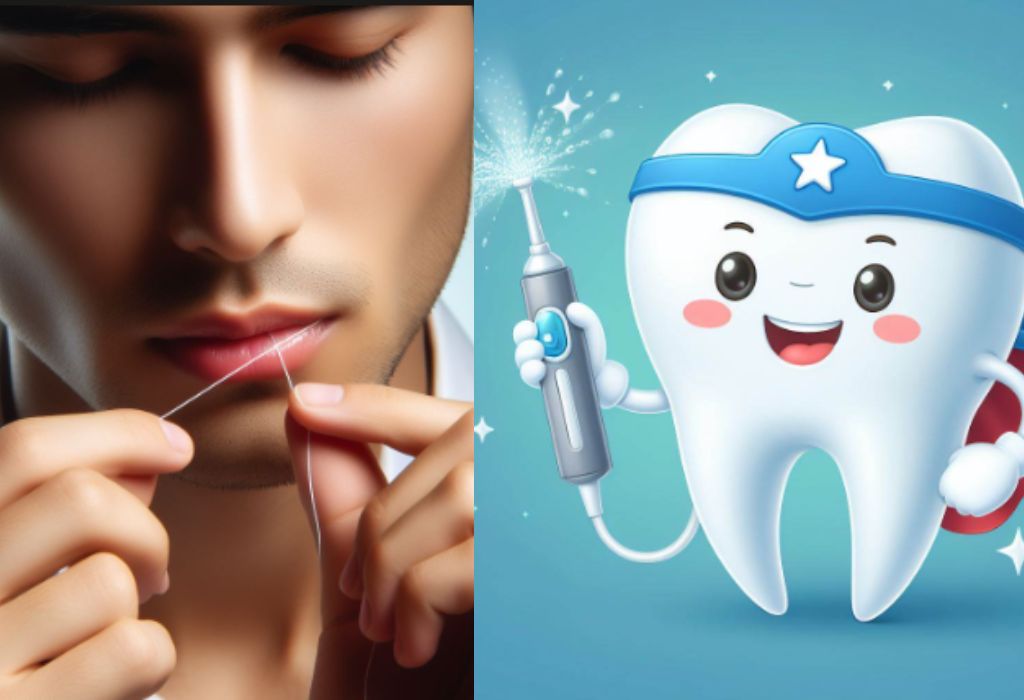Maintaining good oral hygiene is crucial for overall health, and regular flossing is an essential part of a proper dental care routine. However, with various options available, choosing the right tool for your flossing needs can be confusing. Two popular choices are traditional dental floss and water flossers. In this blog, we will compare these two options to help you make an informed decision about which one is right for you.

Dental Floss
Dental floss has been a staple in oral care for decades. It is a thin, thread-like material that is used to clean between teeth and remove plaque and food particles. Traditional dental floss comes in various types, including waxed, unwaxed, flavored, and unflavored.
Research Supporting Dental Floss
- A study published in the Journal of Clinical Periodontology found that regular flossing, when combined with brushing, was more effective at reducing gingivitis compared to brushing alone.
- According to a systematic review published in the Cochrane Database of Systematic Reviews, there is moderate evidence to suggest that flossing, in addition to toothbrushing, reduces gingivitis compared to toothbrushing alone.
Pros of Dental Floss
- Portability: Dental floss is compact and easy to carry, making it ideal for travel or on-the-go use.
- Cost-Effective: Dental floss is relatively inexpensive compared to water flossers, making it a budget-friendly option.
- Effectiveness: Research suggests that when used correctly, dental floss can effectively remove plaque and debris from between teeth and along the gumline.
Cons of Dental Floss
- Manual Dexterity Required: Using dental floss requires manual dexterity, which can be challenging for some individuals, especially those with arthritis or limited hand mobility.
- Potential for Gum Irritation: Improper flossing technique can lead to gum irritation and bleeding.
Water Floss
Water flossers, also known as oral irrigators, use a stream of water to clean between teeth and along the gumline. These devices are typically larger than dental floss and require access to a power outlet or batteries.
Research Supporting Water Floss
- A study published in the Journal of Clinical Dentistry found that water flossers were significantly more effective at reducing gingivitis and plaque compared to dental floss.
- According to a systematic review published in the Journal of Clinical Periodontology, water flossers are effective at reducing bleeding and gingivitis compared to manual toothbrushing alone.
Pros of Water Floss
- Ease of Use: Water flossers are easy to use and require minimal manual dexterity, making them ideal for individuals with limited hand mobility.
- Gentle on Gums: The gentle stream of water from a water flosser is less likely to cause gum irritation compared to traditional floss.
- Effective Plaque Removal: Research suggests that water flossers can effectively remove plaque and debris from hard-to-reach areas between teeth and below the gumline.
Cons of Water Floss
- Cost: Water flossers are more expensive than dental floss, and there may be additional costs for replacement tips or filters.
- Portability: Water flossers are larger and less portable than dental floss, making them less convenient for travel.
Choosing the Right Option
When choosing between dental floss and water flossers, it ultimately comes down to personal preference and individual needs. If you value portability and cost-effectiveness, traditional dental floss may be the right choice for you. However, if you have limited manual dexterity or are looking for a more gentle and effective cleaning method, a water flosser may be a better option.
Conclusion
Both dental floss and water flossers are effective tools for maintaining good oral hygiene. The key is to find the option that best suits your needs and lifestyle. Whether you choose traditional dental floss or a water flosser, the most important thing is to floss regularly to keep your teeth and gums healthy.
FAQs
Is water flossing as effective as traditional flossing?
Research suggests that water flossing can be as effective as traditional flossing in reducing plaque and gingivitis.
Are water flossers safe to use?
Studies have shown that water flossers are safe to use and do not cause any harm to the gums or teeth when used correctly.
Can water flossers replace traditional flossing?
While water flossers can be a convenient alternative to traditional flossing, they may not completely replace the need for traditional flossing in all cases.
Do water flossers reduce the risk of gum disease?
Research indicates that using a water flosser can help reduce the risk of gum disease by removing plaque and bacteria from between teeth and along the gumline.
Can water flossers be used with braces or other dental appliances?
Water flossers can be an effective tool for cleaning around braces and other dental appliances, helping to prevent plaque buildup and cavities.
Do water flossers help with bad breath?
Studies suggest that using a water flosser can help reduce bad breath by removing food particles and bacteria from the mouth.
Are there any disadvantages to using a water flosser?
While water flossers are generally safe to use, some people may experience temporary gum irritation or sensitivity when first using the device.
How often should I use a water flosser?
Dental professionals recommend using a water flosser once a day as part of your oral hygiene routine.
Can children use water flossers?
Water flossers can be used by children, but parental supervision is recommended to ensure proper use.
Are there any specific dental conditions that can benefit from using a water flosser?
Water flossers can be beneficial for people with gum disease, periodontal pockets, and those who have difficulty using traditional floss.
